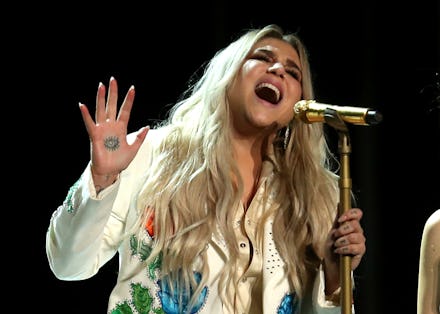Sony Music tweeted in support of Kesha’s Grammys performance. It didn’t go over well.

At Sunday night’s Grammys ceremony, singer Janelle Monáe had the honor of introducing Kesha’s performance of “Praying,” the first single off of her latest album, Rainbow. Monáe used the moment to give a fiery speech in support of #MeToo and the Time’s Up movement — partly because it’s the prevailing cultural conversation of the moment, but also because Kesha herself has been dealing with her own alleged abuser for years.
His name is Lukasz Sebastian Gottwald, a long-time producer for Sony Music more commonly known as “Dr. Luke.” In 2014, the 30-year-old singer sued Dr. Luke in an attempt to get out of her contract with him and Sony Music, saying that he “sexually, physically, verbally, and emotionally abused [Kesha] to the point where [she] nearly lost her life,” according to Rolling Stone.
Dr. Luke denied all allegations and countersued her for defamation. Kesha eventually dropped her lawsuit against Dr. Luke in August 2016, but Luke’s defamation lawsuit is still ongoing, according to the New York Times. Dr. Luke is no longer CEO of Kemosabe Records, the label he started with Sony Music — but he still stands to profit from Rainbow.
Then, in July 2017, Kesha released the song “Praying,” which is thought to be inspired by the trauma caused by Dr. Luke’s alleged abuse.
So, at the Grammys, when Monáe finally ceded the stage to Kesha and those performing alongside her — including Cyndi Lauper, Bebe Rexha and Camila Cabello — it was a powerful moment, one that built upon years of widely publicized legal battles and emotional trauma. The heart-wrenching performance ended with a visibly shaken Kesha being embraced by her fellow performers.
And then, Sony Music chimed in with a tweet. It, uh, did not go over well.
“No words,” it said. “All love. #GRAMMYS.”
Many of the people who replied called out Sony Music, accusing it of being complicit in Dr. Luke’s alleged behavior. Others simply used the hashtag #FreeKesha, a common way for fans to advocate for her freedom from her contract with Sony Music.
In February 2016, a lawyer for Sony said it has made “it possible for Kesha to record without any connection, involvement or interaction with Luke whatsoever, but Sony is not in a position to terminate the contractual relationship between Luke and Kesha.”
Kesha has to produce two more albums with Kemosabe Records before her contract is fulfilled.